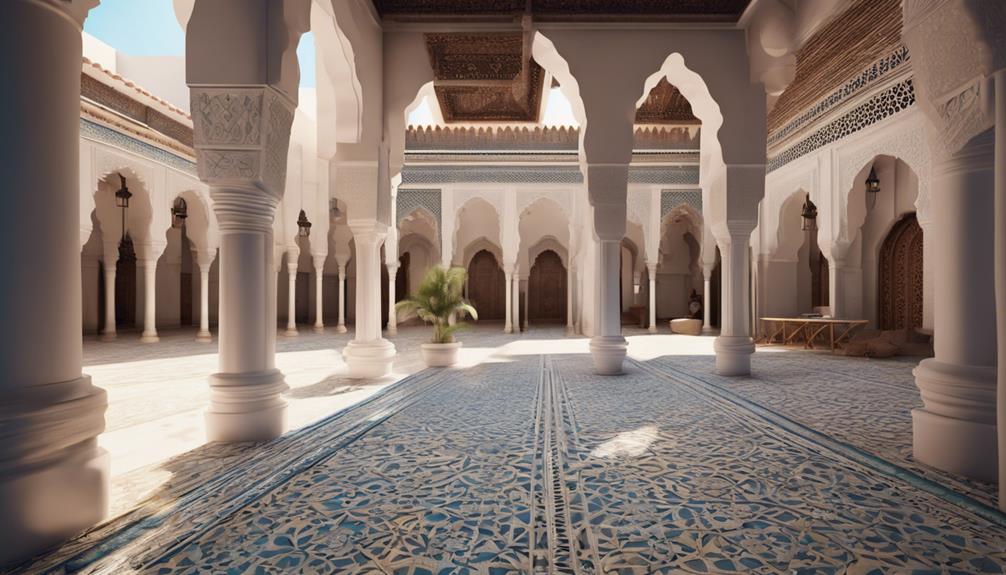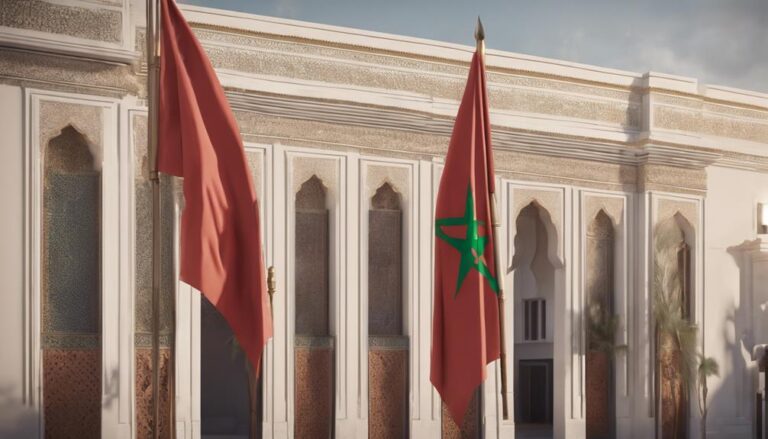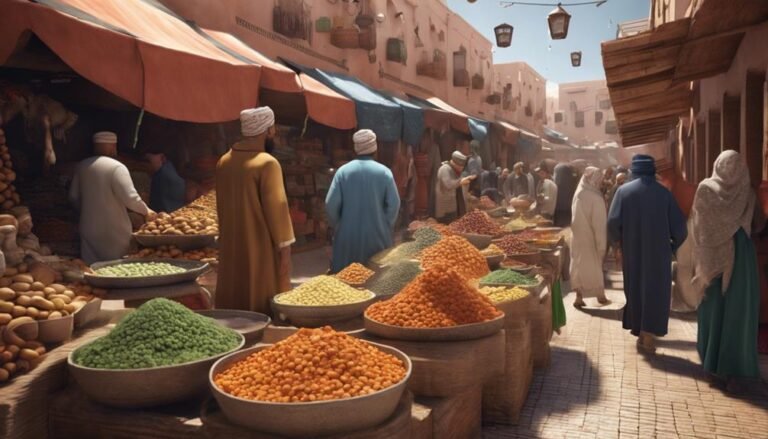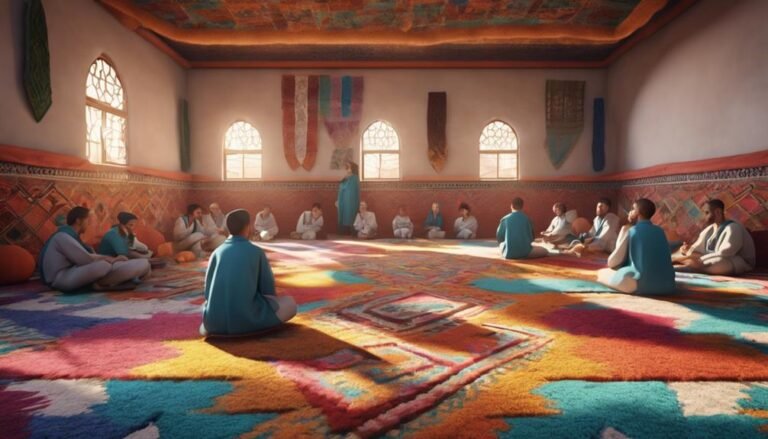The Moroccan judicial system features a hierarchical structure ensuring independence and impartiality in justice delivery. Legal reforms continually work to enhance efficiency and uphold the rule of law, vital for public trust. Different courts like the Court of Cassation handle specific legal matters, guaranteeing fair judgment. Legal professionals play an essential role, advocating, advising, and maintaining system integrity. Cases categorized into civil, criminal, administrative, and commercial types are handled based on distinct regulations. Challenges, such as judicial independence and caseload management, are continuously addressed to guarantee timely justice for all. Discover more about the Moroccan legal system's intricacies.
Key Takeaways
- Hierarchical court system with Court of Cassation at the top.
- Judicial independence ensures impartiality and autonomy in decision-making.
- Legal reforms enhance efficiency and transparency in the system.
- Specialized courts handle cases at the appropriate judicial level.
- Public trust is vital, influenced by fairness of decisions and trust in institutions.
Overview of Moroccan Judicial System
In the Moroccan judicial system, a hierarchical structure governs the administration of justice. Judicial independence, a fundamental principle, guarantees that judges can make decisions free from external influences. Legal reforms have been implemented to strengthen this independence and enhance the efficiency of the judiciary. These reforms aim to streamline court procedures, improve access to justice, and uphold the rule of law.
Judicial independence in Morocco is vital for maintaining public trust in the legal system. By insulating judges from undue pressure, the judiciary can uphold fairness and impartiality in its decisions. Legal reforms have played a significant role in advancing this independence by establishing clear guidelines for judicial conduct and accountability.
The Moroccan judicial system has undergone significant changes in recent years to modernize its operations and align them with international standards. These reforms have bolstered the judiciary's capacity to handle cases efficiently and uphold the principles of justice. Overall, the Moroccan judicial system continues to evolve, guided by the principles of judicial independence and ongoing legal reforms.
Structure of Courts in Morocco
The judicial system in Morocco comprises a diverse range of courts that serve distinct functions within the legal framework. The court structure in Morocco is hierarchical, with each level having specific jurisdiction and responsibilities. At the top of the judicial hierarchy is the Court of Cassation, which is the highest court in the country and primarily deals with reviewing the legality of judgments.
Below the Court of Cassation are the Courts of Appeal, which handle appeals from lower courts and have jurisdiction over specific geographic regions. Beneath the Courts of Appeal are the First Instance Courts, which are the primary trial courts in Morocco, handling a wide range of civil, criminal, and commercial cases.
Additionally, there are specialized courts such as administrative courts and commercial courts that have jurisdiction over specific areas of law. This hierarchical structure ensures that cases are heard and decided at the appropriate level of the judiciary, maintaining order and consistency in the legal system.
Key Features of Moroccan Legal System
Hierarchical in nature, the Moroccan legal system exhibits a structured approach to adjudicating cases through its diverse range of specialized courts. Judicial independence is a fundamental feature, guaranteeing that the judiciary can act impartially without interference from other branches of government. Legal reforms have been implemented to enhance the efficiency and transparency of the legal system, addressing issues such as delays in court proceedings and access to justice. Public perception of the legal system is influenced by factors such as the perceived fairness of court decisions and the level of trust in judicial institutions. Judicial training programs play an important role in equipping judges and legal professionals with the necessary skills and knowledge to uphold the rule of law effectively. By investing in continuous training and professional development, the Moroccan legal system aims to maintain high standards of judicial competence and integrity.
| Key Features | Description |
|---|---|
| Judicial Independence | Guarantees impartiality and autonomy of the judiciary. |
| Legal Reforms | Implemented to enhance efficiency and transparency. |
| Public Perception | Influenced by fairness of decisions and trust in institutions. |
Roles of Legal Professionals in Morocco
Legal professionals in Morocco have distinct duties within the judicial system, operating within a structured hierarchy. Understanding the compliance of professional ethics is essential for practitioners in ensuring fair and just legal proceedings.
Exploring these aspects offers insight into the functioning of the Moroccan legal system.
Legal Professionals Duties
With crucial roles in the Moroccan judicial system, legal professionals in the country play a significant part in upholding justice and ensuring the proper application of the law. Legal professionals have ethical responsibilities and are expected to adhere to high professional standards to maintain the integrity of the legal system. Here is a breakdown of some of the key duties of legal professionals in Morocco:
| Duty | Description |
|---|---|
| Represent Clients | Advocating for clients and presenting their cases effectively in court. |
| Legal Consultation | Providing legal advice and guidance to individuals and organizations. |
| Research and Analysis | Conducting thorough research and analyzing legal issues to build cases. |
These responsibilities require legal professionals to be well-versed in the law and dedicated to upholding justice.
Judicial System Hierarchy
What roles do legal professionals in Morocco play within the hierarchical structure of the judicial system?
In Morocco, legal professionals are essential components of the judicial hierarchy, which consists of various levels of courts.
At the base of the court structure are the first instance courts, where most legal proceedings begin. These courts are staffed by judges and other legal professionals who handle a wide range of cases.
Moving up the judicial hierarchy, one finds the Courts of Appeals, which review decisions made by the lower courts.
At the top of the hierarchy is the Court of Cassation, the highest court in the land, responsible for ensuring the correct application of the law. Legal professionals at each level play critical roles in upholding the integrity and fairness of the Moroccan judicial system.
Professional Ethics Compliance
Adhering to professional ethics is a fundamental requirement for legal professionals in Morocco within the judicial system hierarchy. When it comes to professional ethics compliance, legal professionals in Morocco navigate various ethical dilemmas while ensuring adherence to strict compliance regulations.
Here are some key aspects to keep in mind:
- Confidentiality: Legal professionals must maintain strict confidentiality regarding client information and case details.
- Conflict of Interest: Professionals must avoid situations where personal interests conflict with those of their clients or the legal system.
- Impartiality: Legal professionals are expected to remain impartial and unbiased in their legal representation and decision-making.
- Integrity: Upholding the highest standards of integrity is essential for maintaining public trust in the legal system.
Types of Cases Handled in Morocco
You'll explore the various case categories and legal proceedings that the Moroccan judicial system handles.
Understanding the types of cases processed in Morocco provides insight into the complexity and scope of the legal system.
Identifying the different legal proceedings sheds light on the processes that govern the resolution of disputes within the country.
Case Categories
The Moroccan judicial system categorizes cases into specific types based on the nature of the legal issues involved. Here are the main categories of cases handled in Morocco:
- Civil Cases: These cases involve disputes between individuals or organizations regarding their rights, obligations, or property.
- Criminal Cases: Cases where individuals are charged with violating laws established to protect public welfare.
- Commercial Cases: Cases related to business transactions, contracts, and disputes between companies.
- Administrative Cases: Cases involving challenges to government actions, decisions, or regulations.
Morocco's legal system carefully classifies cases into these categories to make sure that each type of case is handled appropriately and in accordance with the relevant laws and regulations.
Legal Proceedings
When examining legal proceedings in Morocco, one observes a meticulous approach in handling various types of cases categorized based on their nature and legal complexities. In Moroccan courts, you will encounter a range of case types, each requiring specific courtroom etiquette and understanding of legal terminology. Here is a breakdown of the types of cases commonly dealt with in the Moroccan judicial system:
| Case Type | Description |
|---|---|
| Civil Cases | Disputes between individuals or organizations. |
| Criminal Cases | Cases involving violations of the law. |
| Administrative Cases | Cases related to government decisions and actions. |
| Commercial Cases | Cases concerning business and commercial disputes. |
Understanding the nuances of each case type and following appropriate courtroom protocol is vital in maneuvering the Moroccan legal system effectively.
Challenges Faced by Moroccan Judiciary
Facing a myriad of challenges, the Moroccan judiciary is in a critical phase of tackling systemic issues to guarantee efficient and fair legal processes. The challenges faced by the Moroccan judiciary include:
- Judicial Independence: Ensuring that the judiciary remains free from political influence and interference is essential to upholding the rule of law and maintaining public trust in the legal system.
- Corruption: Addressing instances of corruption within the judiciary is paramount to prevent miscarriages of justice and uphold the integrity of the legal system.
- Caseload Management: Effectively managing the growing number of cases to prevent backlogs and delays in court proceedings is necessary for ensuring timely and fair justice for all.
- Resource Allocation: Adequately allocating resources such as staff, technology, and infrastructure to different courts is crucial to enhance the efficiency and effectiveness of the judicial system, ultimately improving access to justice for all citizens.
Conclusion
You have now navigated the intricate web of the Moroccan judicial system, uncovering its structure, key features, and challenges.
Like a skilled detective piecing together clues, you have gained valuable insight into the roles of legal professionals and the types of cases handled in Morocco.
As you step back from this legal puzzle, you have a newfound appreciation for the complexities of the Moroccan judiciary, much like unraveling a fascinating mystery novel.

The Editorial Team is a passionate group of Morocco enthusiasts dedicated to sharing the beauty, culture, and wonders of this captivating country. With diverse backgrounds and a deep love for travel, we strive to bring you engaging and informative content that inspires your Moroccan adventures. From uncovering hidden gems and sharing local insights to exploring mouthwatering cuisine and showcasing the vibrant lifestyle, our team is committed to providing you with valuable resources and exciting stories that enhance your exploration of Morocco. Join us on this journey as we celebrate the rich heritage and unforgettable experiences that make Morocco truly special.







